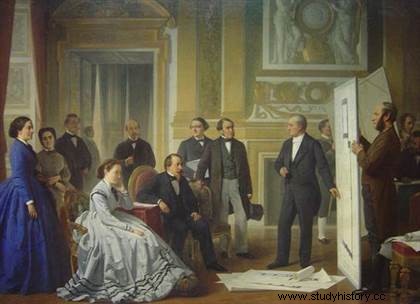 The Second Empire , led by Napoleon III from December 2, 1852 to September 4, 1870, succeeded the short-lived Second Republic. It was a period of great economic growth, particularly industrial, financial and banking, which caused social changes, such as the development of the working class. After an authoritarian phase, marked by the repression of the opposition, a certain liberalization of the regime is emerging. Despite several military and diplomatic successes (Crimean War, Italian campaign), the failure of the Mexican expedition and especially the military defeat against Prussia in 1870 led to the fall of the Second Empire.
The Second Empire , led by Napoleon III from December 2, 1852 to September 4, 1870, succeeded the short-lived Second Republic. It was a period of great economic growth, particularly industrial, financial and banking, which caused social changes, such as the development of the working class. After an authoritarian phase, marked by the repression of the opposition, a certain liberalization of the regime is emerging. Despite several military and diplomatic successes (Crimean War, Italian campaign), the failure of the Mexican expedition and especially the military defeat against Prussia in 1870 led to the fall of the Second Empire.
Louis Napoleon, Prince-President of the Second Republic
On November 4, 1848, the very young 2nd Republic adopted a new constitution, the result of a long negotiation, which entrusted executive power to a president elected by universal suffrage. and legislative power in the National Assembly. Presidential elections are set for December 10 and 11, 1848. They will adapt perfectly to the political ambitions of Prince Louis Napoleon Bonaparte, nephew of the Emperor, who is attempting a return to politics on this occasion.
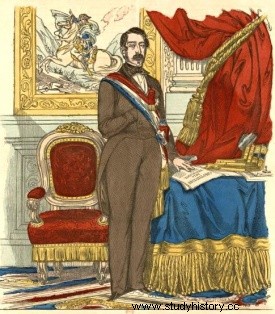 The Republican votes are divided between the candidacies of General Cavaignac (the moderate Republicans), Ledru-Rollin (the the hardest republicans), of Raspail (the revolutionary socialists) and of Lamartine, who has lost all his popularity. The popular current, represented by the most conservative candidates, voted in favor of Louis Napoleon Bonaparte. The Prince's program, carefully drawn up for the election, provides, among other things, for an amnesty for all politically convicted, a reduction in taxes and military conscription*, an ambitious policy of major works in order to fight against unemployment, social welfare measures and modification of industrial legislation.
The Republican votes are divided between the candidacies of General Cavaignac (the moderate Republicans), Ledru-Rollin (the the hardest republicans), of Raspail (the revolutionary socialists) and of Lamartine, who has lost all his popularity. The popular current, represented by the most conservative candidates, voted in favor of Louis Napoleon Bonaparte. The Prince's program, carefully drawn up for the election, provides, among other things, for an amnesty for all politically convicted, a reduction in taxes and military conscription*, an ambitious policy of major works in order to fight against unemployment, social welfare measures and modification of industrial legislation.
On December 20, 1848, Prince Louis Napoleon Bonaparte was elected with nearly three quarters of the vote. He can count on the support of the peasants, of part of the working class, and of the Party of Order, whose strong men will hold the most important ministries. Quickly, the president's mandate moved towards an authoritarian regime, temporarily putting an end to the aspirations of the Republicans.
The birth of the second Empire
At the end of 1851, faced with the impossibility of obtaining a constitutional amendment allowing his re-election, Louis-Napoleon Bonaparte organized a coup d'etat on the symbolic date of December 2. Skillful tactician, he offers himself as a recourse in a situation that he deliberately darkens, relies on the judgment of the people (universal suffrage) and places his action under a double symbolic patronage (French Revolution and Napoleon I). But if an overwhelming majority of the French people approve of the new political regime and the project of a return to expansion in peace, the anti-republican, traumatic repression feeds a lasting animosity against them and prevents the complete success of their plebiscite strategy. .
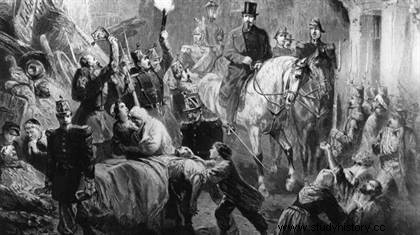 The year 1852 is a year of dictatorship in the Roman sense of the term. The social danger averted, the sterile games of the interrupted parties, institutions which must restore the stability of the country are put in place, at the pace. It suffices, moreover, to repeat the essential provisions of the Constitution of the year VIII. The new constitution was ready on January 14, 1852; it was approved in advance by the plebiscite of December 21.
The year 1852 is a year of dictatorship in the Roman sense of the term. The social danger averted, the sterile games of the interrupted parties, institutions which must restore the stability of the country are put in place, at the pace. It suffices, moreover, to repeat the essential provisions of the Constitution of the year VIII. The new constitution was ready on January 14, 1852; it was approved in advance by the plebiscite of December 21.
The president, "responsible leader" to the people, "the only sovereign I recognize", is chosen for ten years. He governs "by means" of ministers who depend on him alone, of a Council of State composed of 50 "the most distinguished men", who shape his bills and defend them against a Legislative Body which is losing its title of National Assembly. This is made up of 260 to 290 “deputies” and no longer representatives – only the president voted by 8 million French people can claim to be the representative of the people – appointed by universal suffrage in a single-member district ballot. It only sits three months a year to approve or amend bills; at least he votes the budget, but en bloc, without control over the distribution of expenses, which reduces his power to nothing. “Formed of all the illustrations of the country”, the senate has more relief. He judges the constitutionality of laws, is the sole interpreter of the Constitution, which he can modify by senatus-consultum.
After a "questioning trip" across the country, where opinion was skilfully heated by the prefects, it was by the senatus-consultum of November 7, ratified by a plebiscite of the 31st with 7824189 yes against 253145 no, that the prince-president becomes "emperor of the French". Napoleon III was crowned on December 2, the anniversary of the coronation of his uncle, the victory of Austerlitz,... and the coup d'etat of 1851.
The authoritarian empire
In the provinces, efficient prefects with increased powers enforced the Emperor's wishes, aided in their task by an army of civil servants who, from 120,000 in 1851, rose to 265,000 at the end of the Empire. This period is an important step on the French road to centralization. Public opinion must, and moreover is ready to follow. Mayors, deputies of municipalities and teachers are appointed by the prefects.
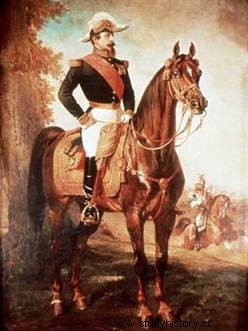 In the legislative body elected on February 29, 1852, out of 261 deputies there are only 8 opponents, including 3 Republicans , who refuse to sit for not having to take an oath of obedience to the Constitution. The prefects handled the “official candidacy” system with a vengeance, ensuring 5,600,000 votes for government candidates, despite 37% abstentions. In the 1857 elections, only 12 opponents out of 267 deputies:Republicans, the “Five” including Émile Ollivier. Jules Favre, Jules Simon, have accepted this time to sit. The imperialists still collect 5.5 million votes. Shouldn't we admit that such majorities cannot be entirely "manufactured", that the authoritarian Empire is indeed a popular regime? Probably the answer should be “average”. France is both anesthetized and seduced.
In the legislative body elected on February 29, 1852, out of 261 deputies there are only 8 opponents, including 3 Republicans , who refuse to sit for not having to take an oath of obedience to the Constitution. The prefects handled the “official candidacy” system with a vengeance, ensuring 5,600,000 votes for government candidates, despite 37% abstentions. In the 1857 elections, only 12 opponents out of 267 deputies:Republicans, the “Five” including Émile Ollivier. Jules Favre, Jules Simon, have accepted this time to sit. The imperialists still collect 5.5 million votes. Shouldn't we admit that such majorities cannot be entirely "manufactured", that the authoritarian Empire is indeed a popular regime? Probably the answer should be “average”. France is both anesthetized and seduced.
However, it is clear that the regime is reactionary, political and social. The repression of December, extended until the law of general security, a veritable "law of suspects", of February 1858, struck almost exclusively "on the left", workers, republicans, ordinary townspeople and country people, the great satisfaction of the men of the Order.
From the coup of 1851, the Empire contracted a "reactionary fold". Despite the efforts of a Morny, President of the Legislative Body until 1865, or a Persigny, Minister of the Interior until 1854, there was no renewal of the political class, the authentic Bonapartists are rare; there is no “imperialist” party. The overwhelming majorities of the Legislative Body are, for the most part, composed of men of the old party of Order, who, the fear of "anarchy" helping, have momentarily forgotten that they were also " liberals”.
The Empire retains and extends the arsenal of repressive laws of its predecessors, particularly in matters of the press. He relies primarily on this pillar of the order that is the Catholic Church, as announced in Bordeaux in 1852 by the one who was still only the prince-president. The congregations multiply; their numbers rose from 4,000 religious in 1851 to 18,000 ten years later; they take control of primary and secondary education. The entire lower clergy, the majority of bishops joined the Empire.
Napoleonic Ideas
However, it is by no means as a champion of the cause of a restored order that Napoleon III would like to appear. If he is the opponent of the reds, he is not necessarily in the camp of the whites. It wants to be blue; his favorite word is “I belong to the Revolution”. The preamble to the 1852 Constitution stipulates that it "recognises, confirms and guarantees the great principles proclaimed and which are the basis of French public power". Son of 89, a man of progress, the emperor had “Napoleonic ideas”, titles a book from 1839.
“Outside, national dignity! “:this is the first of these ideas that he implements. He had certainly promised that the Empire would be at peace. It is however necessary to enter into the bellicose game of Europe in order to erase the shame of the treaties of 1815. England is at the side of France in 1854-1855 during the victorious war of Crimea engaged to stop the Russian threat on the Turkish “straits” linking the Black Sea to the Mediterranean. Prussia and Austria have remained neutral, the old coalition of 1815 is finally broken. At the Paris Congress of February 1856, France, appearing as a mediator, "regained the place in the world that suited her".
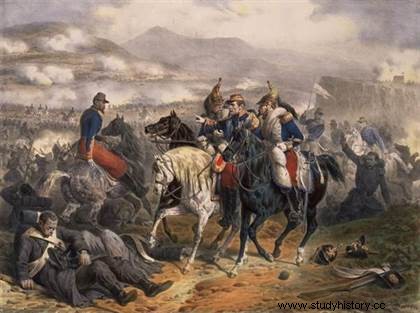 A Europe of progress must respect the principle of nationalities, the right of peoples to self-determination. 1859, it is, alongside the small Piedmont, the victorious war again, but costly in men, against Austria, so that the unity of Italy can be achieved. The latter came out of it almost finished, only Venetia remained with Austria, and above all Rome was left to the pope. France wins Nice and Savoy. We will also attribute to this concern for French greatness the expansion in the world from 1859 to 1867 the conquest of Cochinchina, the protectorate over Cambodia as well as the definitive installation in Senegal.
A Europe of progress must respect the principle of nationalities, the right of peoples to self-determination. 1859, it is, alongside the small Piedmont, the victorious war again, but costly in men, against Austria, so that the unity of Italy can be achieved. The latter came out of it almost finished, only Venetia remained with Austria, and above all Rome was left to the pope. France wins Nice and Savoy. We will also attribute to this concern for French greatness the expansion in the world from 1859 to 1867 the conquest of Cochinchina, the protectorate over Cambodia as well as the definitive installation in Senegal.
Authority, order, "discipline", this is undoubtedly another Napoleonic idea, but on the condition that they are combined with freedom. The emperor is beyond all parties, wants to be the representative of a France finally reconciled with itself. We have clipped the wings of Liberty:it is because she "has never helped to found a lasting edifice, she crowns it when time has consolidated it".
It was thus that, when the time came, a decree of November 24, 1860 restored the right of address to the Legislative Body, and in 1861 the right to examine the budget in detail, by sections. The Napoleonic idea is also the “well-being of the people”; “the reign of the castes is over”. The workers, whom the Empire sought to conciliate, obtained in 1864 the right to strike, an essential conquest. To ensure economic prosperity generating well-being for all, free trade treaties were signed with England in 1860 and, in the following years, with other European countries.
The reign of business
The Empire, in terms of economy, is resolutely modern. This is certainly not yet state interventionism; but we inspire, we sometimes promote progress by direct aid. The years 1852-1870 were a privileged period of agricultural prosperity, thanks to a situation of rising world prices. The activities are centered on the development of the territory, draining and clearing, development of local roads, increased use of fertilizers, start of creation of agricultural credit.
A revolution is happening in the world of banking. Solid but cautious, the network of the "high" or "old" bank had long dominated all financial activities. A decree of November 18, 1852 authorizes the creation of the Crédit Mobilier of the Pereire brothers, which was to be the great national business sponsorship bank dreamed of for a long time by the Saint-Simonian industrialists. Crédit Mobilier plays a decisive role in railway business, both in France and abroad, in Spain and Austria, in town planning in Marseille and Paris, in maritime navigation, with in particular the founding of the Compagnie Générale Transatlantique.
Having played too big a game, countered by traditional banking, the Rothschilds in particular, the Pereires had to withdraw in 1867. Less reckless, large financial establishments opened up which mobilized deposits of individuals to make them grow in industry and business. They constitute the backbone of the future modern banking network:1863, Crédit Lyonnais, 1864, Société Générale and Banque des Pays-Bas, ancestor of Paribas.
Decisive revolution also in the field of the means of communication. In 1870, with 17,000 km, the French rail network was essentially completed, and its construction gave a strong impetus to the development of heavy industries. These are growing at a rate of more than 6% per year, modernizing and concentrating to cope with English competition. We rebuild, we enlarge the cities, Paris, Lyons, Marseilles, Bordeaux; “When the building goes, everything goes. The Empire is the time of money-king. According to a publicist, in 1863, "banks, steamers, railways, large factories, companies of any kind whatsoever, forming a stock and bond capital of 20 billion, were in the hands of 183 financiers". However, still poorly explained, around 1860-1865 a "deceleration" of growth began which would continue until the end of the century.
The metamorphosis of Paris under the Second Empire
Paris in the first half of the 19th century was a sick city. Equipment, housing, roads, sewers, hospitals have not kept up with the great surge in population growth:within the limits of the old Paris lived 600,000 inhabitants in 1801, 817,000 in 1817, 1,152,000 in 1856. In the central districts, densities commonly exceed 1,000 inhabitants per hectare. Cholera claimed 18,400 victims in 1832, 16,000 in 1849.
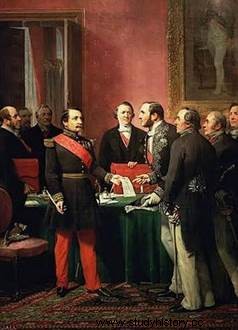 "Paris was about to become uninhabitable", according to Maxime du Camp, when Baron Haussmann was appointed prefect in 1853 of the Seine, to carry out, according to the wishes of the Emperor, a gigantic work of arrangement and embellishment; entire neighborhoods are razed if necessary, rebuilt. The Haussmanian avenue, wide and straight, lined with sidewalks planted with trees and buildings with opulent facades, airs the urban fabric. The circulation network is overhauled.
"Paris was about to become uninhabitable", according to Maxime du Camp, when Baron Haussmann was appointed prefect in 1853 of the Seine, to carry out, according to the wishes of the Emperor, a gigantic work of arrangement and embellishment; entire neighborhoods are razed if necessary, rebuilt. The Haussmanian avenue, wide and straight, lined with sidewalks planted with trees and buildings with opulent facades, airs the urban fabric. The circulation network is overhauled.
A large crossroads pierces Paris, from north to south, by the boulevards of Strasbourg, Sébastopol, Saint-Michel and from west to east by the streets of Rivoli and Saint-Antoine . From the enlarged Place du Château-d'Eau (République), boulevards Magenta and Voltaire, rue de Turbigo, to facilitate access to bustling working-class neighborhoods. To the west, vast avenues radiate around the Étoile, to the north is traversed by Boulevard Haussmann and Rue La Fayette, to the south is the Boulevard Saint-Germain.
The Bois de Boulogne and Bois de Vincennes have been developed. The sewer network increases from 200 to 600 kilometers; the water comes from the Marne and the Dhuys. The operation was costly:2.5 billion. Left to private enterprise, the construction gave rise to unbridled speculation. The wealthy neighborhoods have been embellished, much more than the working-class districts. But in these 60,000 houses, Paris, which annexed its suburbs in 1860, can accommodate nearly 2 million inhabitants, in 20 arrondissements.
The Rise of Perils
The second decade of the reign shows signs of wear, even cracking. In the elections of 1863, the opposition - disparate, ranging from liberal monarchists to republicans - obtained 2 million votes, already about thirty elected. Reduced to silence since 1852, the political class is breathing new life. On January 11, 1864, Thiers made a resounding return to the Legislative Body, demanding the "necessary freedoms", individual, of the press, of opinion, and above all parliamentary freedom.
Warning shot! A certain number of deputies would be ready to form a “third party” around this program:pun for Thiers' party. At the same time, the Empire experienced serious setbacks in foreign policy:difficulties in Italy whose people claimed Rome for their capital, the failure of an adventurous expedition to Mexico, the irrepressible progress of German unity around Prussia.
>Political concessions must be made; in 1867, the right of interpellation was restored to deputies; in 1868, a law considerably relaxed the press regime, a second authorized public meetings during the election period. “Public opinion” can now express itself.
Radically contesting the existence of the regime, the Republican Party began a vigorous offensive comeback on the public scene. Led by a new generation of militants, the Gambettas, the Ferrys, it progressed particularly in the towns. The working class for its part refuses to respond to the advances of the “emperor of the workers”. Social tensions are heightened, ever-increasing strikes, proliferation of workers' union chambers, most of which adhere to the International Workers' Association, which has taken as its motto:"The Emancipation of workers will be the work of the workers themselves . And these indeed put their hopes in a revolution which they imagine very close, which will finally establish the democratic and social Republic.
The Liberal Empire, end or start again?
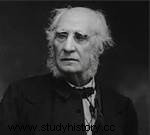 In the 1869 elections, the candidates supported by the government obtained only 4.4 million votes, the opposition, all tendencies taken together, 3.3. Made up of moderate oppositionists and liberal governments, a majority now emerged in the Legislative Body, demanding a return to a parliamentary regime. You have to consent. Two senatus consulta, of September 8, 1869 and April 20, 1870, increased the powers of the two chambers and established ministerial responsibility. Triumph of the liberal third party, but without Thiers, too cumbersome opponent:it is to the reformed republican Émile Ollivier that the emperor entrusts, on January 2, 1870, the task of constituting a "homogeneous ministry, faithfully representing the majority of the Legislative Body" .
In the 1869 elections, the candidates supported by the government obtained only 4.4 million votes, the opposition, all tendencies taken together, 3.3. Made up of moderate oppositionists and liberal governments, a majority now emerged in the Legislative Body, demanding a return to a parliamentary regime. You have to consent. Two senatus consulta, of September 8, 1869 and April 20, 1870, increased the powers of the two chambers and established ministerial responsibility. Triumph of the liberal third party, but without Thiers, too cumbersome opponent:it is to the reformed republican Émile Ollivier that the emperor entrusts, on January 2, 1870, the task of constituting a "homogeneous ministry, faithfully representing the majority of the Legislative Body" .
End of Caesarism! We are returning to the parliamentary system which, since 1830, had delighted the bourgeois political class. Is this the end of the Empire? The "replastering" isn't so bad; why would a parliamentary empire not be viable? Didn't the emperor once promise that, when the time came, he would restore freedom, "the crowning glory of the edifice"? Masterfully indeed. Napoleon III knows how to rebalance the situation to his advantage.
On May 8, 1870, he asked the nation to approve by plebiscite the major reforms he had just agreed to. And universal suffrage acquiesces with enthusiasm:7.3 million yeses, 1.5 million noes, attesting that the popularity of the emperor is intact, even consolidated. The executive is no longer totally sovereign, but it retains both its halo and its prerogative. Deeply disappointed, but resigned, the Republicans realize that it will take them at least another generation of propaganda, education and effort to convert the country.
The legacy of the Second Empire
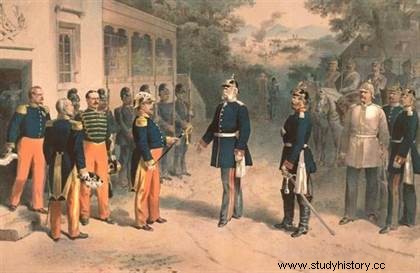 And it is not indeed from this crisis, in the end well overcome, that dies the Empire. He found like a second wind when, imprudently - "with a light heart", says Ollivier -, he engaged, on July 19, in the war of 1870 against this Prussia which became decidedly too arrogant on our border of the Rhine. Victory was going to be easy, it would further consolidate the regime.
And it is not indeed from this crisis, in the end well overcome, that dies the Empire. He found like a second wind when, imprudently - "with a light heart", says Ollivier -, he engaged, on July 19, in the war of 1870 against this Prussia which became decidedly too arrogant on our border of the Rhine. Victory was going to be easy, it would further consolidate the regime.
But immediately, the Prussian forces the borders of Alsace; the bulk of the army, with Bazaine, is shut up in Metz. A relief army, led by Mac-Mahon and the Emperor himself, was cruelly defeated at Sedan on September 1:Napoleon III was taken prisoner. As soon as the news reached Paris, a provisional government of the Republic was put in place:the Second Empire was dead.
Hated by a republican historiography that we have the right to find partial, the Second Empire appears as a hybrid regime. It is and is not both a reissue of the first. Democratic, it remains so:the Constitution reproduces the terms of that of Year VIII, confirms and guarantees the great principles of 1789, but, above all, universal suffrage is maintained - hence once again the apprenticeship of a right on which it will not be possible to go back.
Popular, it is, its longevity, almost twenty years, is the guarantor. Authoritarian, he began by being so, but in the end he liberalized. Totalitarian, he never was. From this empire the country inherited an original tradition, neither really of the right nor of the left, a current that we see reappearing sporadically in French political life.
Bibliography
- The Second Empire, by Pierre Miquel. Tempus, 2008.
- They made and broke the Second Empire, by Eric Anceau. Tallandier, 2019.
- History of the Second Empire, by Gérard Unger. Perrin, 2018.
